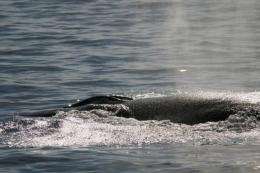US scientists are to investigate what led 22 whales to beach themselves in Florida—killing 17 of them—one of three such incidents in North America over the weekend.
US scientists are to investigate what led 22 whales to beach themselves in Florida—killing 17 of them—one of three such incidents in North America over the weekend.
The dead whales will be "dispersed at different labs across Florida for necropsy," or animal autopsies, Blair Mase, regional stranding coordinator for the National Oceanic and Atmospheric Administration, told AFP on Sunday.
Only five of the 22 pilot whales survived after beaching themselves Saturday morning at Avalon Beach State Park, on the east coast of Florida, despite efforts by volunteers and experts to save the group.
So far, it is unclear why the whales swam ashore. Mase said experts would collect data to try to find out why the whales stranded themselves.
The survivors, four juveniles and one calf, are "stable" and "swimming on their own," Mase said. They are currently at the Harbor Branch Oceanographic Institute and will likely be transported later to SeaWorld in Orlando.
However, two other groups of whales swam onto beaches in North America—one in Cape Cod on Saturday and another in Canada on Sunday—an occurrence that Mase said merited further investigation.
"It's very interesting that we're seeing all these mass strandings occur in North America right now," she added.
Pilot whales are tightly knit and sometimes swim on to beaches as a group when one of them is ill.
In those cases, Mase told local media, it does not help to push the whales back into the water, because they tend to quickly swim back to shore again.
(c) 2012 AFP






















